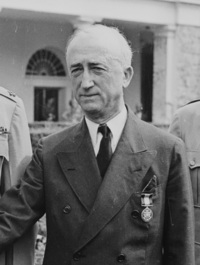Abel Mallaire: Difference between revisions
No edit summary |
No edit summary |
||
| Line 48: | Line 48: | ||
[[Category:Apelia]] | [[Category:Apelia]] | ||
[[Category:Great War (Vasarden)]] | [[Category:Great War (Vasarden)]] | ||
{{Apelia Topics}} | |||
Revision as of 00:53, 7 January 2021
This article is incomplete because it is pending further input from participants, or it is a work-in-progress by one author. Please comment on this article's talk page to share your input, comments and questions. Note: To contribute to this article, you may need to seek help from the author(s) of this page. |
Abel Mallaire | |
|---|---|
 | |
| Prime Minister of Apelia | |
| In office 30 September 1933 – 14 November 1947 | |
| President | Gaël Ménard Jean-Baptiste Brochard |
| Preceded by | Norbert Du Toit |
| Succeeded by | Jean-Baptiste Brochard (Acting) |
| Chairman of the Apelian Socialist Party | |
| In office 16 October 1927 – 3 August 1948 | |
| Deputy | Marius Daucourt Jean-Baptiste Brochard |
| Preceded by | Maxime Vérany |
| Succeeded by | Position Abolished |
| Chairman of the Socialist Internationale | |
| In office 20 February 1943 – 20 February 1947 | |
| Preceded by | Lázár Molnár |
| Succeeded by | Anton Marusić |
| Personal details | |
| Born | Abel Mallaire 5 January 1887 Trieux, Apelia |
| Died | 17 June 1966 (aged 79) Trieux, Apelia |
| Political party | Apelian Socialist Party |
| Spouse | Rachel Mallaire |
| Alma mater | University of Saint-Beaune |
Abel Mallaire (5 January 1887 – 17 June 1966) was an Apelian Flecquist politician who served as the Prime Minister of the Second Apelian Republic from 1933 until 1947. He consolidated power around himself and the Apelian Socialist Party, making it the sole legal party in Apelia. He oversaw the country during the Diarusian Rebellion; he also mandated Apelia's entry into the Great War alongside its allies Granzery and Luepola. As Apelia's fronts collapsed in November of 1947, Mallaire fled to Granzery, and later resigned from his position as Prime Minister, while remaining the Chairman of the party until it was legally disbanded.
As the Allied armies overran the rest of the Coalition, Mallaire fled from Granzery to Luepola, then to the Aitic Union, intending to reunite with the Apelian Government-in-Exile in Bhasar. However, upon the signing of the Sakiarvy Concordium in 1949, Mallaire was instead arrested and extradited to Apelia, where he was convicted of an array of criminal charges, and was sentenced to life in prison. He was released in February of 1966 due to health concerns, and lived the remainder of his life in his hometown of Trieux, dying of cardiac arrest in June of that year.